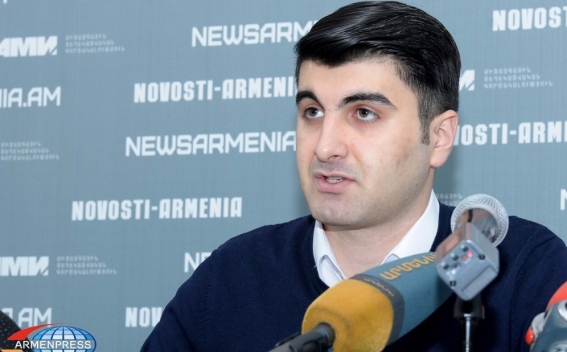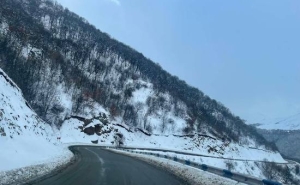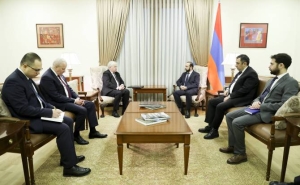 Three Transport Corridors between Russia and Georgia Can Become a Reality
Three Transport Corridors between Russia and Georgia Can Become a Reality

Thanks to the dialogue between Georgia and Russia in the Karasin-Abashidze format, in the future, perhaps, quite serious progress will be recorded. In particular, transport corridors between the two countries can be created.
Back in 2011, when Russia negotiated with Georgia on the issue of membership in the World Trade Organization (WTO) (Georgia was the only country blocking the way of the Russian Federation to the WTO), the parties signed an agreement on transport corridors. It envisaged the creation of three transport corridors, including ones through Abkhazia and South Ossetia, and transit through their territories should in no way affect the status of these entities. In addition, the third party should monitor transit, which, with the consent of the parties, should become the Swiss company SGS.
The delay of the implementation of the agreement for more than five years was due to various nuances and elements of the agreement (indirect participation of Abkhazia and South Ossetia, the scope of eligibility, etc.), concerning which the parties had different approaches.
Nevertheless, Moscow and Tbilisi seem to have been able to demonstrate sufficient political will and, as stated, a joint meeting of the Georgian and Russian parties, as well as representatives of the SGS Company is expected by the end of November. Within the framework of the meeting, Tbilisi and Moscow will sign separate agreements with the Swiss company. In case of their signing, three bilateral transport corridors will operate between Georgia and Russia, at both ends of which the observation posts of the Swiss company will be situated in order to control the transit.
According to the Russian-Georgian agreement of 2011:
- The first corridor starts in the area of Sochi and, passing through the territory of Abkhazia, ends in the city of Zugdidi.
- The second corridor starts near the village of Nar in North Ossetia and, passing through South Ossetia, ends in the city of Gori.
- The third corridor will be stretched between the Kazbegi-Upper Lars checkpoints.
It is interesting that in order to avoid issues related to the statuses of South Ossetia and Abkhazia, the agreement does not mention geographical names, and instead of them just the geographical latitudes and longitudes are mentioned in the agreement.
The formation of transport corridors will also create an opportunity to exploit the Abkhazian railway, which was closed back in the 1990s. This is very important for Armenia as well, but is not in the interests of Baku at the same time. It should be emphasized, however, that some sections of the railway need to be restored, which will require certain time and finances.
The mechanism of transport corridors between the two countries is quite specific and will become the first one of its kind in the world. In fact, it provides an opportunity to separate the field of economic cooperation between the parties from the problem of resolving the conflict between them.
It is significant that both Moscow and Tbilisi have their own interest in the issue of creating transport corridors. The Russian side, fulfilling its obligations, also gets an opportunity to restore the transit opportunities of its southern regions, to increase trade cooperation with the South Caucasus and the Middle East. As for Georgia, the transport corridors, besides increasing the country's transit role, also provide an opportunity to create a favorable background in the process of Russian-Georgian negotiations, which can have a positive effect on removing some remaining restrictions on Georgian goods, as well as for lifting the visa regime for Georgian citizens. It should be noted, that despite the current tension in Russian-Georgian relations, the Russian market is of great importance for Georgia. Russia is the first country for the export of Georgian goods. About half of wine and vodka produced in Georgia, for example, is sold in the Russian market.
As for Abkhazia and South Ossetia, the creation of a transport corridor passing through their territories is perceived ambiguously in both entities. On the one hand, this is seen as a blow to a more or less formed subjectivity, on the other hand, it is perceived as a new opportunity for economic development.
Summarizing all the above said, it can be noted that the formation of a transport corridor between Russia and Georgia and its exploitation will inevitably affect the entire region, creating new opportunities for various actors.
Other materials on this subject
- Nikol Pashinyan Sent Birthday Greetings to Georgian Counterpart I am confident that with joint efforts we will be able to further strengthen the centuries-old friendship of our peoples and expand cooperation between our states. I am full of optimism with regard to...
- Armenia Sends Units of Fire Appliances to Borjomi, Georgia Georgia was offered help from Russia too, but Prime Minister Kvirikashvili said "what we have so far is enough." He hopes that no additional help will be needed.
- Putin Did Not Rule Out the Possibility of Visa Free regime with Georgia "It is extremely important to establish normal relationship between the special services and law enforcement agencies [of the two countries], in order not to allow this [possible] visa-free regime harm...
- Georgia to Continue Balanced Policy in Relations with Russia However, at this stage, there is no progress in resolving main problems.
- Georgia Does Not Exclude Elimination of Visa Regime with Russia According to him further simplification of the visa regime between Russia and Georgia will be discussed at his meeting with the Russian Deputy Foreign Minister Grigory Karasin.
-
 17:08
17:08The regular session of the Anti-corruption Policy Council takes place in Jermuk
-
 15:05
15:05The Prime Minister sends congratulatory messages to the supreme leader of Iran and the President of Iran
-
 11:11
11:11Armenia sends earthquake aid to Turkey
-
 10:43
10:43Commemoration of the Pontiff St. Sahak Partev
-
 09:16
09:16Some roads are closed and difficult to pass in Armenia
-
 19:55
19:55Phone conversation of the Foreign Minister of Armenia with the U.S. Assistant Secretary of State for European and Eurasian Affairs
-
 18:30
18:30Prime Minister Pashinyan and President Khachaturyan meet
-
 18:20
18:20Ararat Mirzoyan with Co-Chairman of the OSCE Minsk Group of France Brice Roquefeuil
-
 17:01
17:01Humans could land on Mars within 10 years, Musk predicts
-
 16:45
16:45France, US urge 'immediate' end to Nagorno Karabakh blockade
-
 16:01
16:01Blockaded Nagorno Karabakh launches fundraiser to support quake-hit Syria
-
 15:59
15:59Earthquake death toll in Turkey rises to 18,342
-
 15:43
15:43Ararat Mirzoyan Held a Telephone Conversation with Sergey Lavrov
-
 15:06
15:06French president rules out fighter jet supplies to Ukraine in near future
-
 14:47
14:475 Day Weather Forecast in Armenia
-
 14:44
14:44President Vahagn Khachaturyan wrote a note in the book of condolences opened in the Embassy of Syria in Armenia
-
 14:20
14:20Azerbaijan’s provocations impede establishment of peace and stability – Armenian FM tells Russian Co-Chair of OSCE MG
-
 12:57
12:57France representation to OSCE: Paris calls on Azerbaijan to restore freedom of movement through Lachin corridor
-
 11:40
11:40Command of Kosovo forces highly appreciated preparation of Armenian peacekeepers
-
 10:16
10:16The United States withdrew from sanctions against Syria for six months the provision of assistance after the earthquake
day
week
month
Humidity: %
Wind: km/h









